|
|
|
Sort Order |
|
|
|
Items / Page
|
|
|
|
|
|
|
| Srl | Item |
| 1 |
ID:
153367


|
|
|
|
|
| Summary/Abstract |
Sometime late last year, ground-launched cruise-missile batteries left Russia’s Kapustin Yar test range, possibly on flatbed rail trucks.1 Amongst these, United States officials contend, was a system that drives a coach and horses through the 1987 Intermediate-Range Nuclear Forces (INF) Treaty. Washington asserts that the cruise missile deployed at the end of 2016 has a range significantly above the INF Treaty threshold. Russia has so far dismissed the US claims.
|
|
|
|
|
|
|
|
|
|
|
|
|
|
|
|
| 2 |
ID:
147699


|
|
|
|
|
| Summary/Abstract |
This article examines the decisions of governments to enter reservations upon ratification of international human rights treaties. I argue that, in the context of the human rights regime, reservations are simply attempts to avoid international legal obligations where they would be consequential. I develop an explanation for their use that focuses on the following two factors: the legal constraints that already exist in domestic law and the likelihood that international agreements will be enforced by domestic courts. Using an original measure of domestic legal protection of civil, political, and personal integrity rights, I find evidence that governments are more likely to enter reservations when domestic legal standards are lax compared to those in the treaty and when judiciaries are likely to enforce treaty-based obligations. This suggests that full adoption of international human rights treaties is more likely when treaties will not create genuine domestic legal constraints and that explanations for treaty adoption and implementation must take reservations into account. It also suggests that adoption of international human rights law is best explained by the specific legal institutions that relate to domestic enforcement rather than broad distinctions between democratic/autocratic political institutions.
|
|
|
|
|
|
|
|
|
|
|
|
|
|
|
|
| 3 |
ID:
034922
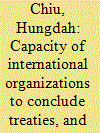

|
|
|
|
|
| Publication |
The Hague, Martinus Nijhoff., 1966.
|
| Description |
xvii, 224p.
|
|
|
|
|
|
|
|
|
|
|
|
Copies: C:1/I:0,R:0,Q:0
Circulation
| Accession# | Call# | Current Location | Status | Policy | Location |
| 001522 | 341.026/HUN 001522 | Main | On Shelf | General | |
|
|
|
|
| 4 |
ID:
143373
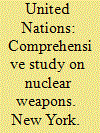

|
|
|
|
|
| Publication |
New York, United Nations Publications, 1981.
|
| Description |
v, 172p.pbk
|
|
|
|
|
|
|
|
|
|
|
|
Copies: C:1/I:0,R:0,Q:0
Circulation
| Accession# | Call# | Current Location | Status | Policy | Location |
| 024689 | 355.825119/UNI 024689 | Main | On Shelf | General | |
|
|
|
|
| 5 |
ID:
030555
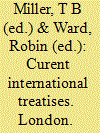

|
|
|
|
|
| Publication |
London, Croom Helm, 1984.
|
| Description |
558p.
|
| Standard Number |
0709917589
|
|
|
|
|
|
|
|
|
|
|
|
Copies: C:1/I:0,R:0,Q:0
Circulation
| Accession# | Call# | Current Location | Status | Policy | Location |
| 025941 | 341.0265/MIL 025941 | Main | On Shelf | General | |
|
|
|
|
| 6 |
ID:
028113
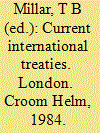

|
|
|
|
|
| Publication |
London, Croom Helm, 1984.
|
| Description |
558p.
|
| Standard Number |
0709917589
|
|
|
|
|
|
|
|
|
|
|
|
Copies: C:1/I:0,R:0,Q:0
Circulation
| Accession# | Call# | Current Location | Status | Policy | Location |
| 024764 | 341.0265/MIL 024764 | Main | On Shelf | General | |
|
|
|
|
| 7 |
ID:
095373
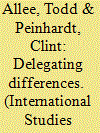

|
|
|
|
|
| Publication |
2010.
|
| Summary/Abstract |
Bilateral investment treaties (BITs) have become the dominant source of rules on foreign direct investment (FDI), yet these treaties vary significantly in at least one important respect: whether they allow investment disputes to be settled through the International Centre for the Settlement of Investment Disputes (ICSID). Through the compilation and careful coding of the text of nearly 1,500 treaties, we identify systematic variation in "legal delegation" to ICSID across BITs and explain this important variation by drawing upon a bargaining framework. Home governments prefer and typically obtain ICSID clauses in their BITs, particularly when internal forces push strongly for such provisions and when they have significantly greater bargaining power than the other signatory. Yet some home governments are less likely to insist upon ICSID clauses if they have historical or military ties with the other government. On the other hand, although host governments are often hostile toward ICSID clauses, particularly when sovereignty costs are high, they are more likely to consent to such clauses when they are heavily constrained by their dependence on the global economy. Our findings have significant implications for those interested in FDI, legalization, international institutions, and interstate bargaining.
|
|
|
|
|
|
|
|
|
|
|
|
|
|
|
|
| 8 |
ID:
002133
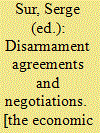

|
|
|
|
|
| Publication |
Aldershot, Dartmouth, 1991.
|
| Description |
vii, 228p.
|
| Standard Number |
1855212579
|
|
|
|
|
|
|
|
|
|
|
|
Copies: C:1/I:0,R:0,Q:0
Circulation
| Accession# | Call# | Current Location | Status | Policy | Location |
| 033574 | 341.733026/SUR 033574 | Main | On Shelf | General | |
|
|
|
|
| 9 |
ID:
153370
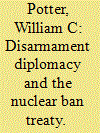

|
|
|
|
|
| Summary/Abstract |
The inclusion of a little-noticed phrase in the final document agreed by a review conference of the Nuclear Non-Proliferation Treaty (NPT) in 2010 can be seen, in retrospect, to have laid the foundation for what, some seven years later, has become a surprisingly successful effort to achieve a legally binding prohibition on nuclear weapons – or, as it is commonly known, a nuclear ban treaty. At the time of writing, a ban treaty was being negotiated at the United Nations, and was likely to be concluded in early July 2017. The ban treaty is, at least in some respects, an outgrowth of what can be termed the ‘humanitarian-impact movement’ (HIM). This movement, pursued by both states and civil-society groups, has sought to refocus attention on the humanitarian consequences of nuclear weapons, and especially the potential impacts of their use.
|
|
|
|
|
|
|
|
|
|
|
|
|
|
|
|
| 10 |
ID:
185994


|
|
|
|
|
| Summary/Abstract |
The regime built around the 1970 Treaty on the Non-Proliferation of Nuclear Weapons (NPT) has helped curtail the spread of nuclear arms for fifty years. In hindsight, it is remarkable only nine states possess the world’s most powerful weapon. The NPT achieved much success during Cold War bipolarity and U.S. unipolarity in its aftermath. But today, China’s rise and Russia’s resurgence have ushered in a new era of emerging multipolarity. Can the treaty withstand the potential challenges of this dynamic environment? There is a real risk that multipolarity may shake the scaffolding of the nonproliferation regime, presenting a significant test to the NPT’s durability. This article identifies four essential elements of the nonproliferation regime: widespread membership, adaptability, enforcement, and fairness. History suggests bipolarity and unipolarity in the international system largely sustained and promoted these NPT features. When international regimes lack such elements, it sharply curtails their long-term efficacy.
|
|
|
|
|
|
|
|
|
|
|
|
|
|
|
|
| 11 |
ID:
072482
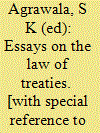

|
|
|
|
|
| Publication |
New Delhi, Orient Longman, 1972.
|
| Description |
xxxv, 303p.
|
|
|
|
|
|
|
|
|
|
|
|
Copies: C:1/I:0,R:0,Q:0
Circulation
| Accession# | Call# | Current Location | Status | Policy | Location |
| 010023 | 341.026/AGR 010023 | Main | On Shelf | General | |
|
|
|
|
| 12 |
ID:
128842
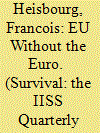

|
|
|
|
|
| Publication |
2014.
|
| Summary/Abstract |
The single currency was supposed to have led to greater political union, but the policies taken to ensure its survival are having the opposite effect. An orderly retreat from the euro might be the EU's least-bad option. As the euro area enters its seventh year of economic stagnation, the future of the European integration process remains in suspense. In the medium-to-long term, highly divergent scenarios remain possible, with variable degrees of likelihood, from full-blown federalisation at one extreme to the catastrophic collapse of the euro and of the European Union at the other. Somewhere in between comes the actual set of policies currently followed, sometimes described as 'muddling through', more aptly called 'muddling down' in terms of its effects on growth and mass unemployment. Since the middle of 2012, the mix of recessive policies of 'internal devaluation', limited pooling of eurozone liabilities and decisive intervention by the European Central Bank (ECB) have deferred for an undetermined period of time the risk of a disorderly break-up of the euro. The strategic consequences of this range of potential and actual policy paths have been discussed in previous issues of Survival.
|
|
|
|
|
|
|
|
|
|
|
|
|
|
|
|
| 13 |
ID:
005508
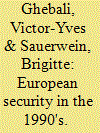

|
|
|
|
|
| Publication |
New York, United Nations, 1995.
|
| Description |
xv,230p.
|
| Standard Number |
9290450975
|
|
|
|
|
|
|
|
|
|
|
|
Copies: C:1/I:0,R:0,Q:0
Circulation
| Accession# | Call# | Current Location | Status | Policy | Location |
| 036859 | 355.03304/GHE 036859 | Main | On Shelf | General | |
|
|
|
|
| 14 |
ID:
192521
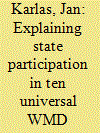

|
|
|
|
|
| Summary/Abstract |
Much of what we know about state participation in universal weapons of mass destruction (WMD) treaties is based on research about the Nuclear Non-Proliferation Treaty (NPT). This article instead analyzes the ratification of all ten current WMD treaties. Using a survival analysis of ratification events (1960–2022), it challenges conventional wisdom. It shows that security threats—a factor stressed by neorealists and research on the NPT—provide only a weak and incomplete explanation. Instead, three types of costs and benefits influence ratification decisions: policy change costs, benefits from the secondary functions of treaties, and benefits from the conformity with the ratification behavior of regional peers. More specifically, the article finds that the possession and pursuit of WMD delays ratification. The country’s support for the liberal hegemonic order, the level of its economic development, and a high regional ratification rate of the respective treaty increase the probability of ratification.
|
|
|
|
|
|
|
|
|
|
|
|
|
|
|
|
| 15 |
ID:
127329
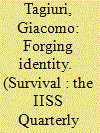

|
|
|
|
|
| Publication |
2014.
|
| Summary/Abstract |
A more prominent and direct European role in the protection of cultural heritage and promotion of the arts could revitalise an exhausted integration process.
|
|
|
|
|
|
|
|
|
|
|
|
|
|
|
|
| 16 |
ID:
101836


|
|
|
|
|
| Publication |
2011.
|
| Summary/Abstract |
While the concept of friendship has been largely invisible within Western political debate, in the international political domain, 'friendship' and the language of friends have been prominent in treaties and alliances between nations. Database searches on the topic of 'politics and friendship' locate predominantly references concerning relationships between states. However, it has been war and enmity rather than friendship that has dominated analysis in international relations literature. In this article we provide a history of international treaties, focusing in particular on those named as friendship treaties. We will discuss the use of concepts and terminology related to friendship and the nomenclature associated with international alliances. It will be argued that friendship is more a tool of public relations and spin, rather than diplomacy and peace-building, and the cynical use of friendship does not sit easily with the Nehruvian concept of friendship as an important method of diplomacy that can act as a path to peace, goodwill and understanding between states and nations.
|
|
|
|
|
|
|
|
|
|
|
|
|
|
|
|
| 17 |
ID:
187210
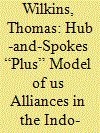

|
|
|
|
|
| Summary/Abstract |
A reassessment the nature of “alliances” and “alignments” since the end of the Cold War, both practically and conceptually, is long overdue. Treaty alliances have become partially obsolescent as new models of security cooperation, such as the ‘strategic partnership’, and other “minilateral” configurations, have emerged as preferred instruments of alignment. The evolving nature of alliance and alignment is nowhere better illustrated than in the metamorphosis of the venerable Hub-and-Spokes US alliance system in the Indo-Pacific. This article captures the changes occurring in the US alliance system from both a macro-level (structural) standpoint, before proceeding to the micro-level to evaluate individual alliance/partnership dyads to illustrate the complexion of the hub-and-spokes “plus” configuration of today. It argues that we are witnessing is a “reshuffling of the deck” in terms of traditional treaty allies – with Japan and Australia now forming the “core” of the system, with South Korea effectively confined as a “single-issue” alliance focused on the peninsula, and with Thailand and the Philippines (arguably) becoming increasingly “peripheral”. But even as the original treaty-system contracts, Washington is seeking to “network” the original model through the acquisition of non-treaty strategic partnerships with key states such as India, Singapore, (and, more circumspectly – Taiwan), whilst also welcoming European engagement. This networking strategy is also designed to achieve second and third order effects through incentivisation of direct “spoke-to-spoke” security cooperation and through the concentration of allies/partners into minilateral formations. The resultant reconfiguration might be dubbed a Hub-and-Spokes “plus” model.
|
|
|
|
|
|
|
|
|
|
|
|
|
|
|
|
| 18 |
ID:
186731


|
|
|
|
|
| Summary/Abstract |
The Universal Declaration of Human Rights (UDHR) is thought to have shaped constitutions profoundly since its adoption in 1948. The authors identify two empirical implications that should follow from such influence. First, UDHR content should be reflected in subsequent national constitutions. Second, such reflections should bear the particular marks of the UDHR itself, not those of the postwar zeitgeist more broadly. The authors examine the historical evidence at various levels to identify and untangle the UDHR's impact. In a macro analysis, they leverage an original data set on the content of constitutions since 1789. They explore historical patterns in the creation and spread of rights, and test whether 1948 exhibits a noticeable disruption in rights provision. The authors build a multivariate model that predicts rights provision with constitution- and rights-level covariates. To gain further analytic leverage, they unearth the process that produced the UDHR and identify plausible alternative formulations evident in a set of discarded proposals. The authors further test the plausibility of UDHR influence by searching for direct references to the document in subsequent constitutional texts and constitutional proceedings. The evidence suggests that the UDHR significantly accelerated the adoption of a particular set of constitutional rights.
|
|
|
|
|
|
|
|
|
|
|
|
|
|
|
|
| 19 |
ID:
028914
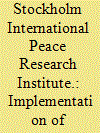

|
|
|
|
|
| Publication |
Stockholm, Stockholm Interrnational Peace Research Institute, 1973.
|
| Description |
74p.
|
|
|
|
|
|
|
|
|
|
|
|
Copies: C:1/I:0,R:0,Q:0
Circulation
| Accession# | Call# | Current Location | Status | Policy | Location |
| 012968 | 341.733/SIP 012968 | Main | On Shelf | General | |
|
|
|
|
| 20 |
ID:
044395
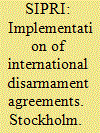

|
|
|
|
|
| Publication |
Stockholm, SIPRI, 1973.
|
| Description |
74p
|
|
|
|
|
|
|
|
|
|
|
|
Copies: C:1/I:0,R:0,Q:0
Circulation
| Accession# | Call# | Current Location | Status | Policy | Location |
| 012967 | 341.733/SIP 012967 | Main | On Shelf | General | |
|
|
|
|
|
|
|
|
|